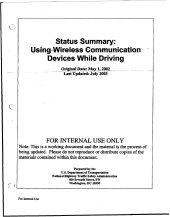
The New York Times reported yesterday that the National Highway Traffic Safety Agency (NHTSA) kept the public in the dark about research that warned about the risks of distracted driving.
The information is now coming to light thanks to Freedom of Information Act requests by two advocacy groups (the NY Times has published the entire body of research).
Interviewed by the NY Times, the former head of the NHTSA said:
“… he was urged to withhold the research to avoid antagonizing members of Congress who had warned the agency to stick to its mission of gathering safety data but not to lobby states.”
The director of the Center for Auto Safety (one of the two groups who pressed to have the research made public) told the NY Times that, “We’re looking at a problem that could be as bad as drunk driving, and the government has covered it up.”
Researchers concluded that in 2002, a total of 955 fatalities and 240,000 injuries were caused by people using cell phones while driving.
Researches also drafted — but never sent — a letter to the Transportation Secretary at the time. The letter issued a warning that hands-free laws might not solve the problem. From the letter:
“A significant body of research worldwide indicates that both hand-held and hands-free cell phones increase the risk of a crash. Indeed, research has demonstrated that there is little, if any, difference between the use of hand-held and hands-free phones in contributing to the risk of driving while distracted…
We recommend that drivers not use these devices when driving, except in an emergency.”
Cell phone use while driving and distracted driving in general is a perennial issue in this country. States and cities have tried to curtail the behavior through a mish-mash of legislation that usually falls short of really stopping it.
In Oregon, legislators passed a new law this past session that seeks to curtail the use of handheld cell phones while driving. However, the law, HB 2377, not only allows the use of hands-free devices, but it allows exceptions for a variety of circumstances including, “a person operating a motor vehicle in the scope of the person’s employment.”
What’s even more startling about this news is that Dr. Jeffrey Runge, the former head of the NHTSA, said he felt the issue was “dire and needed public attention.” Here’s more from the NY Times:
“I really wanted to send a letter to governors telling them not to give a pass to hands-free laws.”
According to the draft letter, researchers were concerned that passing hands-free laws would give people the wrong impression. From the letter:
“…such legislation might erroneously imply that hands-free phones are safe to use while driving.”
Officials from the NHTSA maintain that the conclusions are not definitive and that the findings were never meant for public consumption.
Either way, hopefully this news helps usher in an era of increased scrutiny on prevention of distracted driving. But I wouldn’t hold my breath. Drunk driving is largely vilified in the U.S. because drinking has a long legacy of being a sin in this country and advocacy groups like MADD have been highly successful. Eating a burger and/or chatting with your friend while you drive — while arguably just as dangerous — is far from garnering the same amount of public censure.
I wonder how these revelations would have impacted the vote on HB 2377 in Salem. I also wonder if we will see more stringent legislation in upcoming sessions.
I also wonder what other important traffic safety research and reports have been withheld from the American public because of politics.

